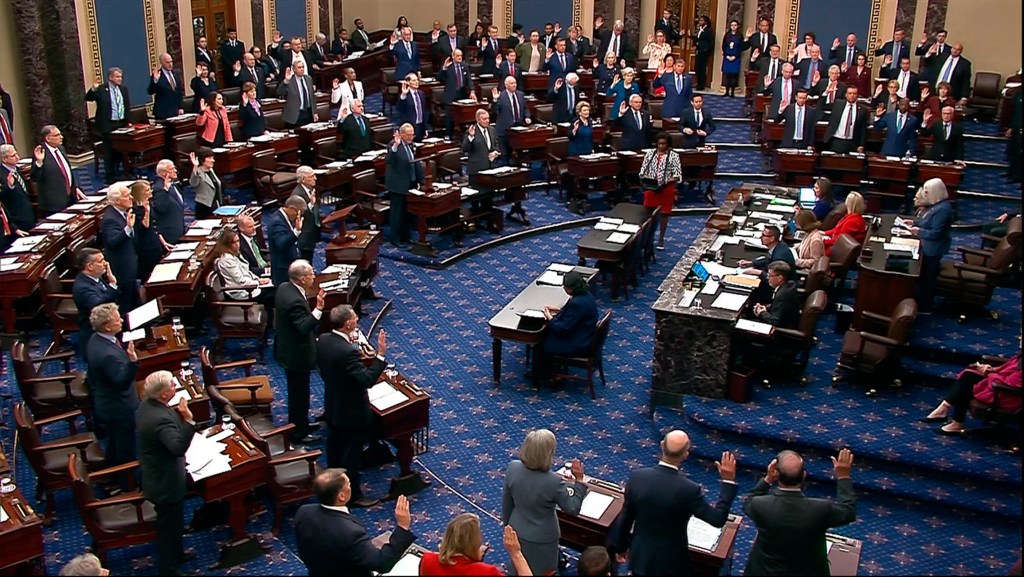The Committee to Protect Journalists (CPJ) joined more than 85 journalism and civil society organizations and 35 attorneys and law professors in urging the Senate Judiciary Committee to schedule a markup of the Protect Reporters from Exploitative State Spying Act (PRESS Act) as soon as possible so that it can be considered by the full Senate and become law.
“The PRESS Act is a bipartisan shield bill that would protect journalist-source confidentiality, subject to common-sense exceptions, such as cases involving terrorism, other serious emergencies, or journalists suspected of crimes,” the signatories stated.
The legislation, which CPJ helped author, passed the House twice but has previously stalled in the Senate.
Read the full letter.
Global press freedom updates
- Mexican journalist Alberto Amaro Jordán receives death threats in Tlaxcala
- Brazil’s top court acts to protect journalists from judicial harassment
- CPJ alarmed by Cameroonian authorities’ use of administrative detention law
- Journalists assaulted at MK election rally ahead of South Africa elections
- CPJ joins call for renewing mandate of UN special rapporteur on Eritrea
- Russia confirms detention of Ukrainian journalist Viktoria Roshchina
- Prominent Serbian minority newspaper repeatedly threatened in Croatia after nationalist party gains power
- Georgian parliament overrides presidential veto, adopts Russian-style ‘foreign agents’ law
- Tunis court sentences 2 journalists to 1 year in prison, prevents hearing coverage
- Journalist missing after being seized outside his Pakistan home
- Chair of Nepal’s largest media group arrested after publication of reports alleging fraud
- Proposed broadcast law amendments threaten press freedom in Indonesia
Spotlight
CPJ is deeply alarmed by the continued killings of journalists in Pakistan, including four in May so far.
On May 21, Nasrullah Gadani, a reporter for local Sindhi language newspaper Awami Awaz, was attacked by armed assailants in the Kori Goth area of the Ghotki district in Sindh province. He suffered critical gunshot wounds to his abdomen, according to Zia ur Rehman, a local journalist in Karachi who spoke to CPJ, and multiple media reports. Gadani died in a Karachi hospital on May 24.
On the same day, Kamran Dawar, a journalist based in the North Waziristan district of the Khyber Pakhtunkhwa province, was killed by unidentified assailants in front of his home in Tappi village, according to multiple media reports.
Earlier in May, journalists Ashfaq Ahmad Sial and Muhmmad Siddique Mengal were killed in separate attacks in Pakistan’s Punjab and Baluchistan provinces.
“Pakistani authorities must immediately investigate the brutal killings of journalists Nasrullah Gadani and Kamran Dawar, and other journalists killed and attacked, and make the findings public swiftly,” said CPJ Asia Coordinator Beh Lih Yi.
While CPJ has not yet been able to confirm whether their killings were related to their work, the killings represent the highest number of journalists killed in the South Asian country in any single month since CPJ began collecting data in 1992.
Read more about the wave of violence against journalists in Pakistan.
- Collision course: An investigation into the death of a journalist hated by Rwandan authorities — Cécile Andrzejewski, Forbidden Stories
- A Black newspaper in Washington state gets a second life: ‘We can’t let the Black Lens die’ — Andrew Buncombe, The Guardian
- To protect democracy, protect exiled journalists — Antonio Zappulla, Project Syndicate
- Global Media Index for Africa — Prof Wallace Chuma, Rutendo Faithful Nyaku, Dr. Trust Matsilele, Professor Colin Tredoux and Grace Itumbiri, Africa No Filter and The Africa Center
- Greatest hits from a ‘Journalism in the Movies’ course — Dr. Anya Schiffrin and Sheila Coronel, Global Investigative Journalism Network
